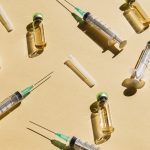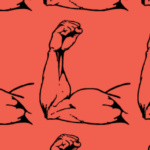Testosterone is the main androgen (a type of hormone) in men and it’s important for normal development and overall wellbeing. There is a range of factors that influence the level of testosterone in your blood and how it works in your body, some of which you can change and some you can’t. However, there is also plenty of products and techniques promising to “boost” your testosterone, with results ranging from unhelpful to harmful for your health. Here are the evidence-backed factors that affect your testosterone.
1. Genes
Your testosterone production and the way it functions in your body is influenced by your genetic makeup. A reference range is used as a guide by testing laboratories and doctors to decide whether a person’s hormone levels are low and whether treatment may be needed. However, sitting anywhere in this range (and even outside of it) can be ‘normal’ and it’s not a case of the higher the better. The ideal level of testosterone varies from person to person. Genetic abnormalities and conditions, such as Klinefelter’s syndrome, can cause low testosterone or androgen deficiency in men.
2. Health conditions and disease
Men can experience a drop in testosterone due to conditions or diseases affecting the testes (commonly called testicles), pituitary gland or hypothalamus (the parts of your nervous and endocrine systems that control your hormones). These include undescended testes, physical injury, infection, cancer and cancer treatment.
There’s also a well-established link between diabetes and testosterone — men with diabetes are more likely to have low testosterone and men with low testosterone are more likely to later develop diabetes. Type 2 diabetes can be prevented or delayed in up to 58% of cases by maintaining a healthy weight, being physically active and eating a healthy diet, and doing so can influence your testosterone levels.
3. Weight
Being overweight or obese is linked to a decline in testosterone and weight loss can significantly increase testosterone levels, especially in people who have more weight to lose. Both healthy diet and physical activity, or bariatric surgery are weight loss methods that help increase testosterone. Maintaining a healthy weight can also reduce the small decline in testosterone that normally occurs as you age.
4. Age
Testosterone levels generally peak during adolescence (as it drives the physical changes that happen during male puberty) and early adulthood. As men age, there may be a small, gradual drop in testosterone, but this is often due to the effects of other conditions such as diabetes and your weight. Healthy older men with normal body weight usually do not experience a significant drop in testosterone levels in their blood, and there is no such thing as ‘male menopause’ or ‘andropause’.
5. Sleep
Testosterone production is dependent on quality sleep. A small study on 10 young men found their daytime testosterone levels decreased by 10% to 15% after one week of having their sleep restricted to five hours per night. Although more research is needed on the relationship between testosterone and sleep, getting the recommended amount of quality shut-eye is essential for your overall health and wellbeing.
6. Steroids
Testosterone replacement therapy is used to return testosterone levels to normal in men with medically diagnosed androgen deficiency. Testosterone must be prescribed by a medical practitioner, usually a GP, after evaluation by a specialist physician in sexual medicine, endocrinology, or urology. Abusing steroids is illegal and carries significant health risks. It’s been linked to serious conditions including cardiovascular disease, liver and brain damage, rhabdomyolysis, embolism, gynaecomastia, acne and infertility. After stopping the abuse of steroids, it can take many months for the body’s testosterone production to restart, resulting in lower-than-normal testosterone levels during this time.















